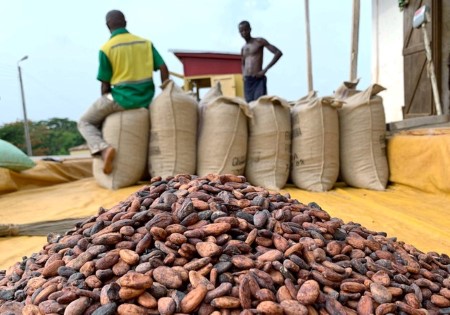Ivory Coast, the world’s largest cocoa-producing nation, has warned it may take action that could lead to higher global cocoa prices if the United States follows through on newly proposed import tariffs. The warning comes in response to the Trump administration’s announcement of a 21% tariff on cocoa products from Ivory Coast — the highest rate proposed for any West African country under the current trade policy review.

While President Donald Trump has temporarily paused the implementation of the tariffs for 90 days, officials in Ivory Coast are urging a full reversal. Speaking at a press conference in the commercial capital, Abidjan, on Thursday, Agriculture Minister Kobenan Kouassi Adjoumani said the government is prepared to respond economically if the U.S. fails to ease its stance.
Potential Price Repercussions for Consumers
“When you tax our product that we export to your country, we will increase the price of cocoa, and that will have a repercussion on the price to the consumer,” Minister Kouassi declared. Though he did not elaborate on the exact policy tools that would be used, his message was clear: if U.S. tariffs raise the cost of exporting Ivorian cocoa, those costs will be passed down the supply chain — ultimately hitting American consumers.
While Ivory Coast does not control the international price of cocoa, which is set by the global commodities market, it has the authority to increase export taxes on cocoa shipments. Doing so would allow the country to offset losses from new tariffs while simultaneously making cocoa exports more expensive — a cost that could reverberate through international markets and reach chocolate manufacturers and end consumers.
U.S. Cocoa Imports at Stake
The stakes are high for both countries. According to data from the Coffee and Cocoa Council (CCC), Ivory Coast exports between 200,000 and 300,000 metric tons of cocoa to the United States annually. This volume represents a significant portion of the U.S. cocoa supply, much of which is used by major chocolate and confectionery brands.
Analysts warn that if Ivory Coast retaliates with price hikes or redirects its cocoa to other markets, it could cause disruption in U.S. supply chains and lead to higher prices on everything from chocolate bars to cocoa-based beverages.
Eyeing Stronger Ties with Europe
As part of its strategic response, Ivory Coast is also exploring ways to deepen trade relationships with other global partners — particularly the European Union. Minister Kouassi signaled that the EU could play a crucial role in absorbing any excess cocoa output if U.S. market access is restricted.
“If our products are not accepted in the United States, the EU can recover all of them,” he said, hinting at ongoing diplomatic efforts to secure alternative markets.
This shift in focus comes at a time when EU countries are already top buyers of West African cocoa and are increasingly committed to sustainable and ethical sourcing, making them attractive long-term partners for producers like Ivory Coast.
Trade Tensions Amid Global Cocoa Volatility
The threat of higher cocoa prices comes amid growing volatility in global cocoa markets. Prices for cocoa have surged in recent months due to a combination of climate challenges, disease outbreaks in cocoa-producing regions, and logistical bottlenecks.
A trade dispute between the U.S. and Ivory Coast — especially one involving tariffs and retaliatory pricing — could further destabilize an already tense market.
A Call for Dialogue and Fair Trade
Minister Kouassi concluded his remarks with a call for dialogue, emphasizing Ivory Coast’s desire to maintain strong commercial ties with the United States but on fair and equitable terms.
“We are not closing the door,” he said. “We simply want our partners to understand the impact these measures have on both our farmers and global consumers.”
As the 90-day pause period begins, all eyes are on Washington and Abidjan to see whether diplomacy will win out — or whether consumers worldwide should brace for a new surge in cocoa costs.



